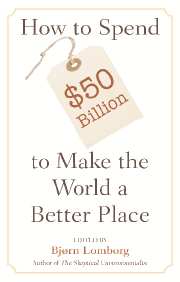Book contents
- Frontmatter
- Contents
- Contributors
- Introduction
- 1 Meeting the Challenge of Global Warming
- CLIMATE CHANGE – OPPONENTS' VIEWS
- 2 Communicable Diseases
- COMMUNICABLE DISEASES – OPPONENTS' VIEWS
- 3 The Challenge of Reducing the Global Incidence of Civil War
- THE CHALLENGE OF CONFLICTS – OPPONENTS' VIEWS
- 4 Toward a New Consensus for Addressing the Global Challenge of the Lack of Education
- THE CHALLENGE OF LACK OF EDUCATION – OPPONENTS' VIEWS
- 5 The Challenge of Poor Governance and Corruption
- THE CHALLENGE OF POOR GOVERNANCE AND CORRUPTION – OPPONENTS' VIEWS
- 6 Hunger and Malnutrition
- HUNGER AND MALNUTRITION – OPPONENTS' VIEWS
- 7 Population and Migration
- POPULATION: MIGRATION – OPPONENTS' VIEWS
- 8 The Water Challenge
- THE WATER CHALLENGE – OPPONENTS' VIEWS
- 9 Subsidies and Trade Barriers
- SUBSIDIES AND TRADE BARRIERS – OPPONENTS' VIEWS
- Expert Panel Ranking
- Index
THE CHALLENGE OF CONFLICTS – OPPONENTS' VIEWS
Published online by Cambridge University Press: 27 July 2009
- Frontmatter
- Contents
- Contributors
- Introduction
- 1 Meeting the Challenge of Global Warming
- CLIMATE CHANGE – OPPONENTS' VIEWS
- 2 Communicable Diseases
- COMMUNICABLE DISEASES – OPPONENTS' VIEWS
- 3 The Challenge of Reducing the Global Incidence of Civil War
- THE CHALLENGE OF CONFLICTS – OPPONENTS' VIEWS
- 4 Toward a New Consensus for Addressing the Global Challenge of the Lack of Education
- THE CHALLENGE OF LACK OF EDUCATION – OPPONENTS' VIEWS
- 5 The Challenge of Poor Governance and Corruption
- THE CHALLENGE OF POOR GOVERNANCE AND CORRUPTION – OPPONENTS' VIEWS
- 6 Hunger and Malnutrition
- HUNGER AND MALNUTRITION – OPPONENTS' VIEWS
- 7 Population and Migration
- POPULATION: MIGRATION – OPPONENTS' VIEWS
- 8 The Water Challenge
- THE WATER CHALLENGE – OPPONENTS' VIEWS
- 9 Subsidies and Trade Barriers
- SUBSIDIES AND TRADE BARRIERS – OPPONENTS' VIEWS
- Expert Panel Ranking
- Index
Summary
In their challenge paper, Paul Collier and Anke Hoeffler estimate the costs of civil war and propose a number of opportunities to reduce their total incidence. Their favored options in economic terms are to avoid conflicts recurring by targeted use of aid or international military intervention. Tony Addison and Michael Intriligator make constructive criticisms of the analysis and conclusions in their separate opponent papers.
While acknowledging that the challenge paper presents the most comprehensive estimate to date of the cost of a typical war, Addison has some concerns about the authors' methodology. In particular, he criticizes their valuation of Disability Adjusted Life Years (DALYs), necessary to calculate the health costs of conflict. Collier and Hoeffler use a figure of $1,000, effectively valuing the economic loss rather than the value of life itself. He regards this approach as largely discredited, and supports instead a “willingness-to-pay” valuation of life, which typically gives figures some five times greater.
Addison's second criticism of methodology relates to the discount rate used (5%). This is a mechanism to account for a preference to receive a benefit now rather than a larger one at some time in the future. He believes there is a case for DALYs not to be discounted at all, but accepts that, whatever the methodology used, a constant discount rate must be used for opportunities across all challenges to allow them to be ranked properly.
- Type
- Chapter
- Information
- Publisher: Cambridge University PressPrint publication year: 2006



